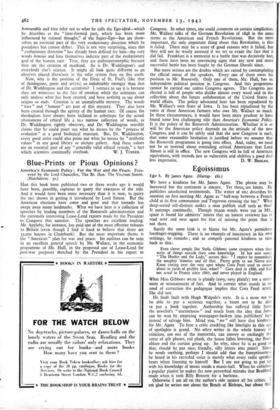Blue-Prints or Pious Opinions ?
America's Economic Policy: For the War and the Peace. Fore- word by the Lord Chancellor, The Rt. Hon. The Viscount Simon. tHutchinson. 5s.) HAD this book been published two or three weeks ago it would have been, possibly, captious to query the exactness of the title. And it would have been more necessary than it is now, to query the tact shown in getting it introduced by Lord Simon. But the American elections have come and gone and that tornado has swept away many landmarks. What we have here 'is a collection of speeches by leading members of the Roosevelt administration and the extremely interesting Lease-Lend reports made by the President to Congress this summer. The speeches are excellent reading. Mr. Appleby, for instance, has paid one of the most effective tributes to Britain (even though I find it hard to believe that there are 35,000 houses in Clydebank). But the most important theme is the " American " plan for war and peace. Its outlines can be seen in an excellent general speech by Mr. Wallace, in the economic programme of Mr. Hull, in the proposed use of Lease-Lend for post-war purposes sketched by the President in his report to Congress. In other times, one could comment on certain simplicities. Mr. Wallace talks of the German Revolution of 1848 in the same terms as the American and French Revolutions. But the most important, the only important thing about that Revolution, is that it failed. There may be a score of good reasons why it failed, but they will not be wisely assessed if we try to evade the fact that it did fail., Frankfurt is a memorial to a battle that was decisively lost, and there have been no convincing signs that any' new and more successful battle has been fought by the German liberals since.
But more serious are the doubts which are raised by contemplating the official status of the speakers. Every one of them owes his position to Mr. Roosevelt. Only one of them, Mr. Hull,- has an independent political position in Congress. And this programme cannot be carried out unless Congress agrees. The Congress just elected is full of people who dislike almost every word said in the collection about the future collaboration of the' United States in world affairs. The policy advocated here has been repudiated by Mr. Wallace's own State of Iowa. It has been replidiated by the votes of those American farmers who owe Mr. Wallace so much. In these circumstances, it would have been more prudent to have found some less challenging title than America's .Economic Policy. It is the policy of the Roosevelt Administration. Whether it is or will be the American policy depends on the attitude of the new Congress, and it can be safely said that the new Congress is such, that some reasonable hesitation is justified before we assume that the Roosevelt programme is going into effect. And, today, we need not be so worried about reminding critical Americans that Lord Simon is still in office. The new Congress will be full of American equivalents, with records just as vulnerable and abilities a good deal


























 Previous page
Previous page